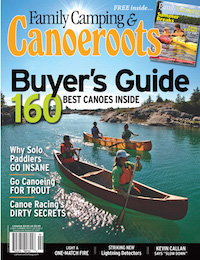Buying a used camper can be like rolling dice—you might win big, you might lose. The trick is to weight the dice in your favour by being a smart shopper.
The big advantage to buying used is that campers depreciate in value faster than they deteriorate. You’ll find used campers at RV dealerships, in the classifieds, and in the shopping guide at the corner store. With perseverance, there’s a good chance you’ll find a camper in pristine condition for a fraction of its new price.
Once you’ve found an enticing pre-owned camper, there are a few important things to check before deciding it will be a sound investment.
Get Down and Dirty
Check the undercarriage for serious rust, cracks and signs of old repairs. While you’re crawling around, be sure there are no cables or lines hanging loose. Check the floor for rot, especially beneath the doors. If tire wear is uneven, it might indicate a bent axle. If you’re negotiating with a dealer, try to get a repacking of the wheel bearings and an inspection of the brakes as part of the deal.
Watch for Water
Exterior joints are supposed to be re-caulked regularly, so old, dried-up caulk is a sign of neglect. Remember though, an isolated spot of new caulk could mean that a leak was patched. Check all joints for possible leaks, especially around openings in the roof and inthe corners. Check every inch of the ceiling for signs of water damage, as repairs to a ceiling can cost a fortune. Look under sinks, beds and in every compartment for signs of water damage. Use your nose and knuckles—check for the smell of mildew and knock while listening for the sound of punky wood. Look also for signs of insect or rodent damage.
The Gadgets
Make sure all appliances and systems operate properly. Insist that the camper be connected to power and water before you reach for your bankroll. Check all lights, faucets and the outside shower. Make sure the electrical and gas appliances work properly, especially the expensive refrigerator and air conditioner. In the case of a pop-up, be sure that the lift system works smoothly and easily and that the canvas is not mouldy or brittle.
Know You Can Tow
Check the towing capacity of your vehicle and be sure it exceeds the gross vehicle weight rating of the RV. Check to see what class of hitch you’ll need and whether your vehicle needs special wiring for the running lights and brakes.
There are a thousand little things you could check, but being thorough while checking these big things will let you put your money down with confidence.
Ralph Yates wrote about keeping your RV looking like new in the June issue last year.




